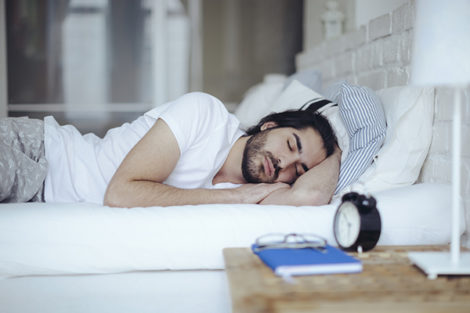Limit use of screens, learn from sophrology: Practical ways to enjoy more restful sleep

Adopting good habits can help you enjoy more restful sleep. Image: IStock/Eva-Katalin.
A trying time for many people, 2020’s post-vacation season has been made particularly stressful by the ongoing COVID-19 pandemic and the lockdowns that most of us were forced to endure this year.
Difficulties sleeping and waking up at odd times of the night are often a direct consequence of the worries and fears that have preoccupied us throughout the day. Fortunately, there are plenty of practical things we can do, like limiting our use of screens and practicing meditation and sophrology, which can help us enjoy truly restful and restorative sleep.
You are tired, you go to bed, but instead of drifting off into peaceful slumber, you toss and turn without getting a wink of sleep. This is not an unusual scenario for millions of people around the world, which may not only be disheartening, but can also be damaging to one’s health.
Waiting for the onset of sleep that does not come is just one of the many difficulties caused by insomnia, which can also cause you to wake up at odd hours of the night, to the point where you feel tired and depressed and have trouble concentrating during the day.
The good news, however, is that there are plenty of surprisingly simple and common things you can do to enjoy more restful sleep. As a first step, sleep experts recommend you cut down on stimulants, including coffee, sodas and energy drinks.
Everyone understands the logic of this measure, but it is not quite so easy to implement because you are supposed to avoid all of these beverages by 2 p.m. At the same time, it is also advised that people eat lighter evening meals and steer clear of food with high fat content, which can be replaced with starch and carbohydrates.
Limit use of screens
Better managing your use of screens may not be easy when you consider just how omnipresent they are not only in the working world where sitting in front of a computer all day is surprisingly common, but also in a whole host of leisure activities.
Here, again, expert opinion on how we should use our devices differs with the way most of us behave. The standard wisdom is to limit the amount of time we spend on screens and that it should be punctuated at regular intervals with alternative physical and manual activities.
Another important recommendation is to turn off all of our devices one to two hours before going to bed. And off means off, not just in sleep mode which allows for a constant flow of messages, calls and other notifications.
Sophrology can help
Those who have tried everything but still cannot get the sleep they need might do well to try sophrology, a self-help method that harmonizes mind and body, and helps relieve tension and worries that prevent restful sleep through physical and mental exercises. The mix of breathing and visualization exercises developed by sophrology also promotes better stress management and mindfulness at all times of the day.
The movement, which has long been popular in France, has recently spread to the English-speaking world notably through the publication of guides to the discipline. A case in point is “The Life Changing Power of Sophrology”, which was published in 2019.
Last but not least are different audio aids with guided relaxation exercises. Recently, a French startup has combined a large number of these into an antique-looking device it has christened Morphée. On the front of the Morphée are three old-style alarm-clock keys that enable users to choose a relaxation technique, a theme for a session (body or breathing, for example) and a duration, which varies between eight and 20 minutes.
For the moment, the new gadget, which has already attracted large numbers of customers, is only available in a French-language version, but an English device is reportedly on its way soon. CC
RELATED STORIES:
COVID-19 pandemic causing some to have strange and bizarre dreams